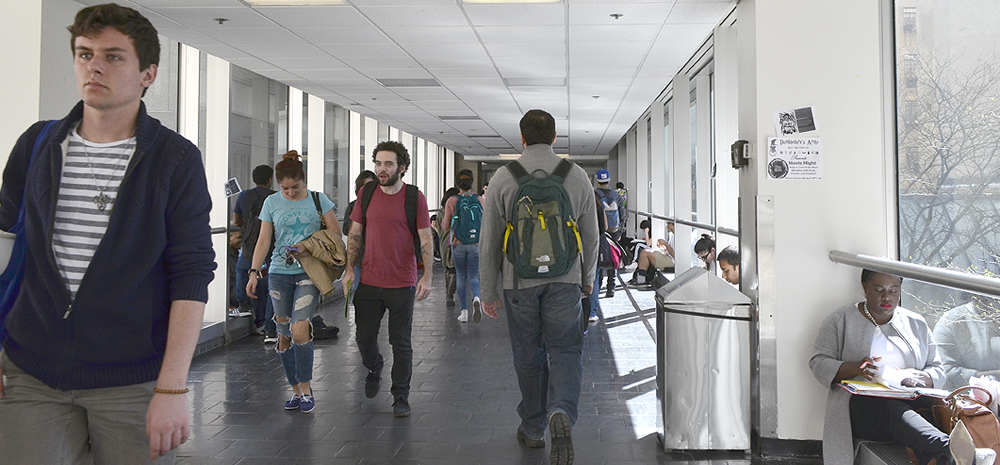
Article by Carmen Rios-Nuñez, December 16, 2016
Help
The number of college students seeking mental health support has increased exponentially since 2009, according to a 2014 article by the American Psychological Association.
Hunter students who believe they may be struggling with mental health issues can find help right on campus, said Ariella Soffer, Ph.D, an intake coordinator at Hunter’s Counseling and Wellness Services. Students can speak to a mental health professional about their problems or concerns about such issues as anxiety, poor self-esteem and feelings of depression. According to the department’s welcome sheet, the “counselors help students identify and address problematic thoughts, feelings, and behaviors to help them understand themselves, develop greater awareness and insight into the cause of personal difficulties, and help develop resilience by improving problem-solving and coping skills.”
“I believe CWS is a valuable resource to Hunter students because we address and attend to the nonacademic issues that can and do have a significant impact on the personal and academic success of our student body,” Soffer said in an email. “Assessment of our services demonstrates that we do so effectively and successfully, so we invite students to take advantage of this resource.”
Data compiled by Soffer and her peers revealed that approximately 63 percent of students assessed by a clinician exhibit signs of depression, a serious mood disorder. It can cause severe symptoms that affect how a student feels, thinks and handles daily activities, such as sleeping, eating, or working. According to a National Data on Campus Suicide and Depression by Neumann University, depression affects more than 19 million American adults 18 and older each year, and is responsible for more than an estimated 60 percent of suicides.
The Hunter Experience

“I didn’t want to go to school,” and she experienced feelings of depression when she was 15 to 17 years old, said Katherine Hernandez, 22, a senior majoring in creative writing. “You don’t want to make friends. You’re not sociable. You just kind of want to be in a corner by yourself and you’re waiting for the clock to get ready to go home.”
Wearing a black beanie hat and vest, blue jeans, and brown leather boots in a North Building’s classroom, Hernandez said that she took Aripiprazole, also known as abilify, when she was a teenager. It is a medication that works in the brain and treats schizophrenia, a chronic and severe mental disorder that affects how a person thinks, feels, and behaves. She stopped taking it because it made her feel drowsy and unlike herself.
Aripiprazole works by re-balancing dopamine and serotonin to improve thinking, mood, and behavior, according to the National Alliance of Mental Illness. For Hernadez, therapy, which she underwent on and off from the time she was about 14 years old until she was 21, helped her overcome depression. She said that she had considered visiting a mental health counselor at Hunter, but didn’t because she was unsure that the school would keep her information private.
“It’s actually really hard to find a decent therapist in New York City, which is why I had considered going to Hunter. Everybody wants somebody to talk to,” Hernandez said. “I’m not taking therapy right now, but I have my moments when I wish I did have it again.”
According to the CWS website, a student’s counseling records are not part of their academic record. Some exceptions can include needing to share information in the event of a psychological emergency requiring hospitalization. The website states that the counseling process is confidential and that the student will be informed if exceptions occur.
Mental health related issues have also increased outside of the college. According to a 2016 report by the Anxiety and Depression Association of America, major depressive disorder affects more than 15 million American adults in a given year. Mariette Rodriguez, 36, a St. John’s University alumna who graduated with an associate in liberal arts degree in 2002, and is a personal trainer and health coach, said she can remember feeling like something was wrong with her ever since she was 14 years old. She would often feel sad without having any reason to be.
Mariette Rodriguez
When she was a high school student, Rodriguez said she would stay home from school whenever she felt down, and ultimately decided not to attend her graduation ceremony because she had a falling out with friends and didn’t want to deal with reality. Most of the time she said she wanted to zone out and not face the world. “I went through a really bad funk 10 years ago and that’s when I decided I needed to speak to someone,” she said in a phone interview. “I knew I needed help.” Rodriguez was about 24 years old when the birth of her niece inspired her to see a therapist. Soon after, she was diagnosed with depression.
Her college experience was a rocky one. She was registered as a full-time student, but said she wasn’t dedicated to her studies. “I think my depression definitely played a role in my lack of ambition in college,” Rodriguez said. “I attended four years and never wanted to attend class.” Rodriguez said she didn’t seek help at the St. John’s University mental health department because she was a member of a sorority group and spent most of her free time with her “sisters.” But also said that if a school offers help and a student feels he or she needs it, they should not feel ashamed to seek it.
Hernandez said that her depression is in the past, but it affected her “immensely” in high school. “It gets easier to deal with it when you seek help, when you find a good therapist that can talk with you about things and you can really understand why you feel this way,” she said.
Rodriguez, too, said that understanding feelings can be helpful, and that it’s “nice to know that there’s a reason for the way I’m feeling and cope with it.” She also credited yoga and meditation as ways to have better days. Rodriguez stressed that she doesn’t like when people tell those suffering from depression to just “shake it off.”
“I don’t want people to feel judged about it,” she said. “The same way you wouldn’t make fun of someone with cancer, you shouldn’t make fun of someone with depression. If you’re suffering from it, go out and talk to someone. Research it and seek help.”
Hunter students who want to seek help can visit Hunter’s CWS located in the East Building, Room 1123, Monday through Friday, between 9 a.m. and 5 p.m. Students can also email CWS any time at PersonalCounseling@hunter.cuny.edu.
“I would advise any student who feels tentative about seeking help to call and speak to a counselor about their hesitation and, or worry about their privacy, confidentiality, or other concern which may inhibit their pursuing services,” said Soffer. “I am confident that such a conversation would provide reassurance, clarify misconceptions, and alleviate the concerns.”

Hunter students had strong opinions about the 2016 presidential race.
Carmen Rios-Nuñez can be reached at Carmen.Rios66@myhunter.cuny.edu